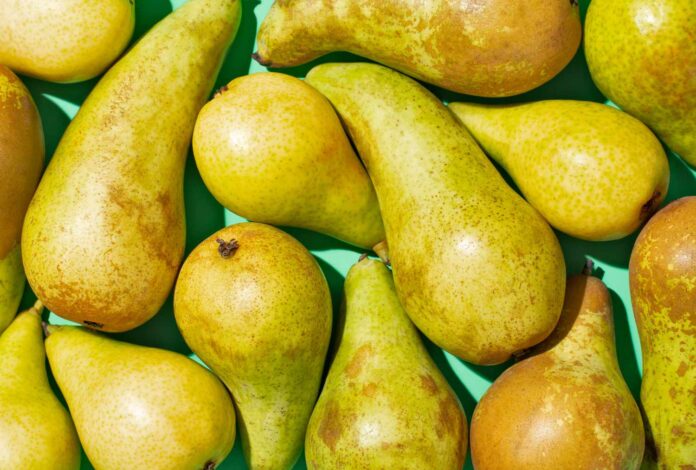:max_bytes(150000):strip_icc():format(jpeg)/how-long-do-pears-last-FT-BLOG0924-6d8a563d7fb94938879b2719bc6d942c.jpg)
Although peak pear season varies around the country, these irresistible fruits usually show up at farmers markets and grocery stores from August until the end of October. Pears are one of the few fruits that ripen after they are picked, so they will often be sold unripe at the store — but that doesn’t mean you should pass them up! If you store the fruit properly and practice a little patience, you can enjoy ripe, juicy pears and extend their life in the refrigerator. Here’s everything you need to know about keeping pears fresh so you can snack on them or use them in recipes like Flaky Pear Pie or Beet and Pear Salad.
How to store or ripen pears
Pears are harvested when they are mature rather than ripe. To help them ripen, keep them at room temperature, uncovered. Handle with care to prevent bruising — if your pear has blemishes or cuts, it will allow bacteria to start breaking down the fruit’s tissue, causing it to spoil more quickly, says Sisavath Keovilay, Ph.D., chef and university department chair at Keiser University Center for Culinary Arts. “At room temperature, most pears will last from five to seven days, depending on how they’re picked and handled,” he says.
Pears that are ripe can last up to a week in the fridge, says Trung Vu, chef-instructor of Pastry & Baking Arts at the Institute of Culinary Education. “Unripened pears can last up to ten days or a little longer, and will ripen faster if left at room temperature and then refrigerated after ripening,” he adds.
Trung Vu, chef-instructor of Pastry & Baking Arts at the Institute of Culinary Education
“Put pears in a brown paper bag that’s folded closed and leave it at room temperature overnight [to ripen them quickly]. You will come back to a much more ripened pear the next day.”
— Trung Vu, chef-instructor of Pastry & Baking Arts at the Institute of Culinary Education
Once your pears have ripened, you can store them in your refrigerator’s crisper drawer to slow the breakdown of starch to simple sugar that causes molds and yeast to ferment the pear, Keovilay says. In the fridge, take care to store your pears in a perforated or unopened bag. Like several other popular fruits, pears give off ethylene gas, which causes them to ripen faster. When you contain that gas, you may speed up the process even more, Keovilay explains.
You can use this knowledge to your advantage, however, if you want your pears to ripen very quickly. “Put them in a brown paper bag that’s folded closed and leave it at room temperature overnight,” Vu says. “You will come back to a much more ripened pear the next day.”
Photo by Victor Protasio / Food Styling by Margaret Dickey / Prop Styling by Christina Daley
How to test the ripeness of a pear
You can check the ripeness of a pear by giving it a very gentle squeeze, per Vu: Under-ripe pears will feel hard and firm, but ripe pears will have a little give to them, particularly around the neck. (It’s worth noting that certain varieties like Bartlett will brighten with ripeness, but this isn’t the case with all pears.)
When is a pear too ripe? “The first thing you can do to determine if a pear has gone bad is to inspect it visually for mold or discoloration,” Vu says. “If the skin is broken, or if the fruit is too soft or mushy, this can be another indicator the pear has gone bad.” A spoiled pear will usually look unappealing, too — it may look brown (or more brown than usual, in the case of Bosc pears) and develop dark spots, Keovilay says.
An off smell, sour flavor, or fizzy sensation (like you’re sipping on a carbonated drink) when you eat a pear can also suggest that it’s fermented past its prime, per Vu.
The good news is that eating a bad pear is unlikely to make you seriously ill. “Eating pears past their prime may give you an upset stomach, but they will not make you sick in the sense you will be missing work or hospitalized,” says Janet Buffer, M.P.H., senior institute manager for the Institute for Food Safety and Nutrition Security at George Washington University. “Pears past their prime are simply ‘spoiling.’”
How to freeze pears
Even if you follow all the protocols outlined above, your pears are unlikely to survive more than two weeks, if that. If you know you won’t eat all of your pears in time, you may want to consider freezing them, says Shauna C. Henley, Ph.D., family and consumer sciences senior agent at the University of Maryland College of Agriculture and Natural Resources. Wash your fruit, peel and core it, slice it, then freeze on a baking sheet before transferring to ziplock bags.
Even frozen pears won’t last forever, but you can still expect them to maintain their quality for 10 to 12 months, Henley says. If you’re a big pear fan, that means you can comfortably enjoy the fruit all year long for use in smoothies or baking.



